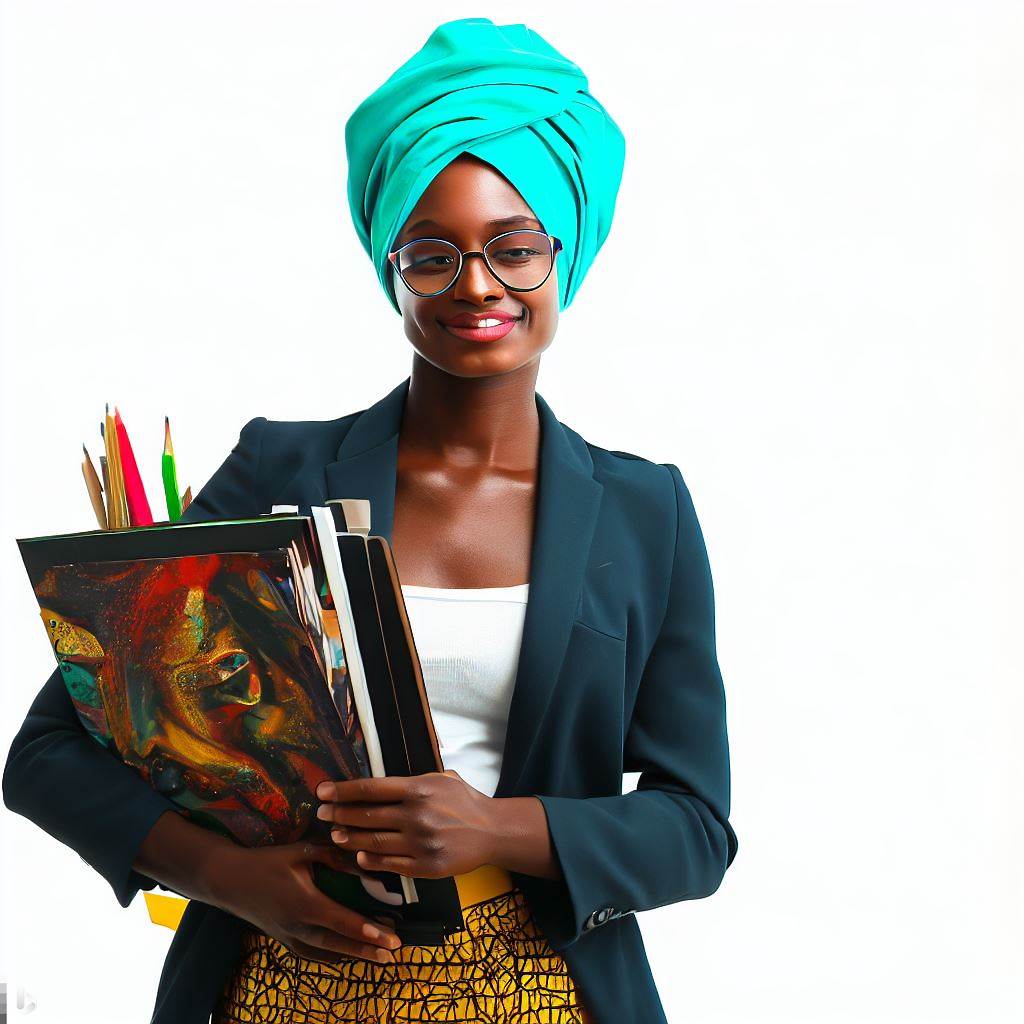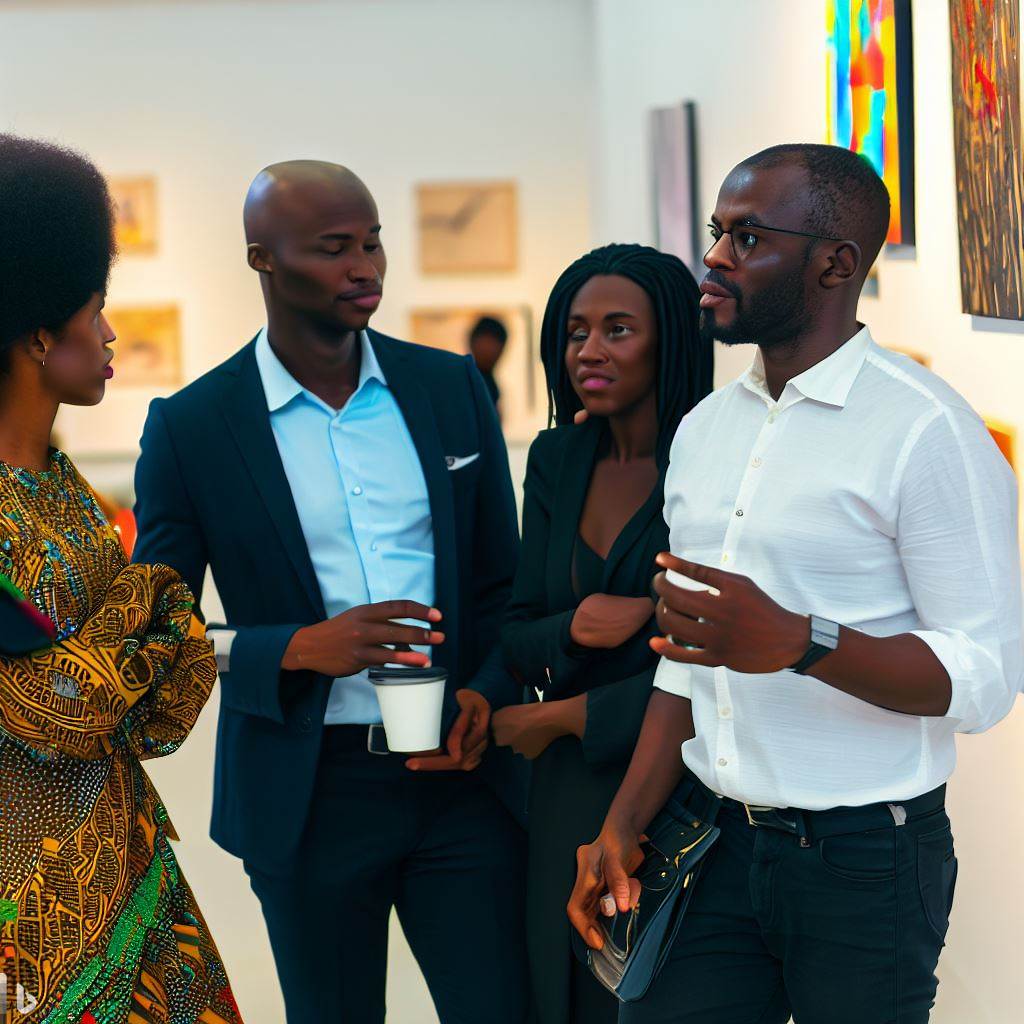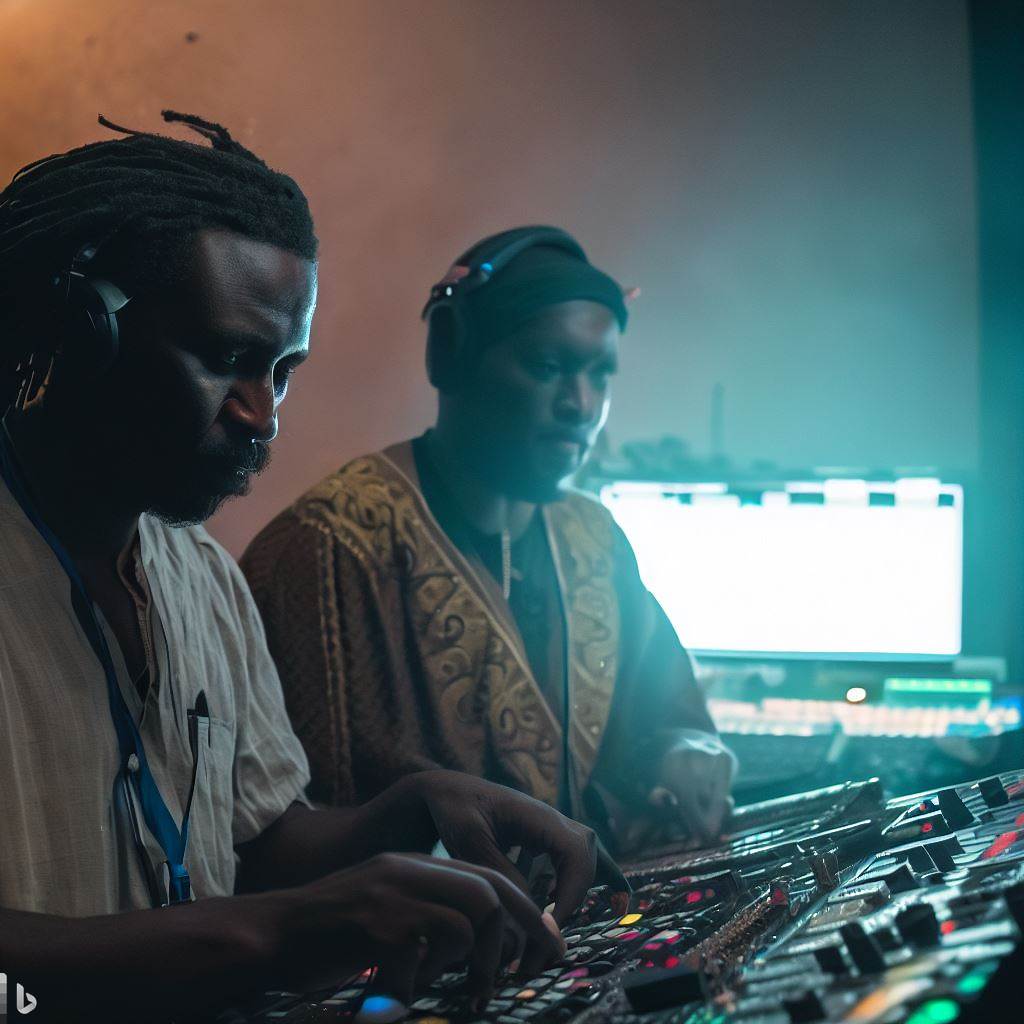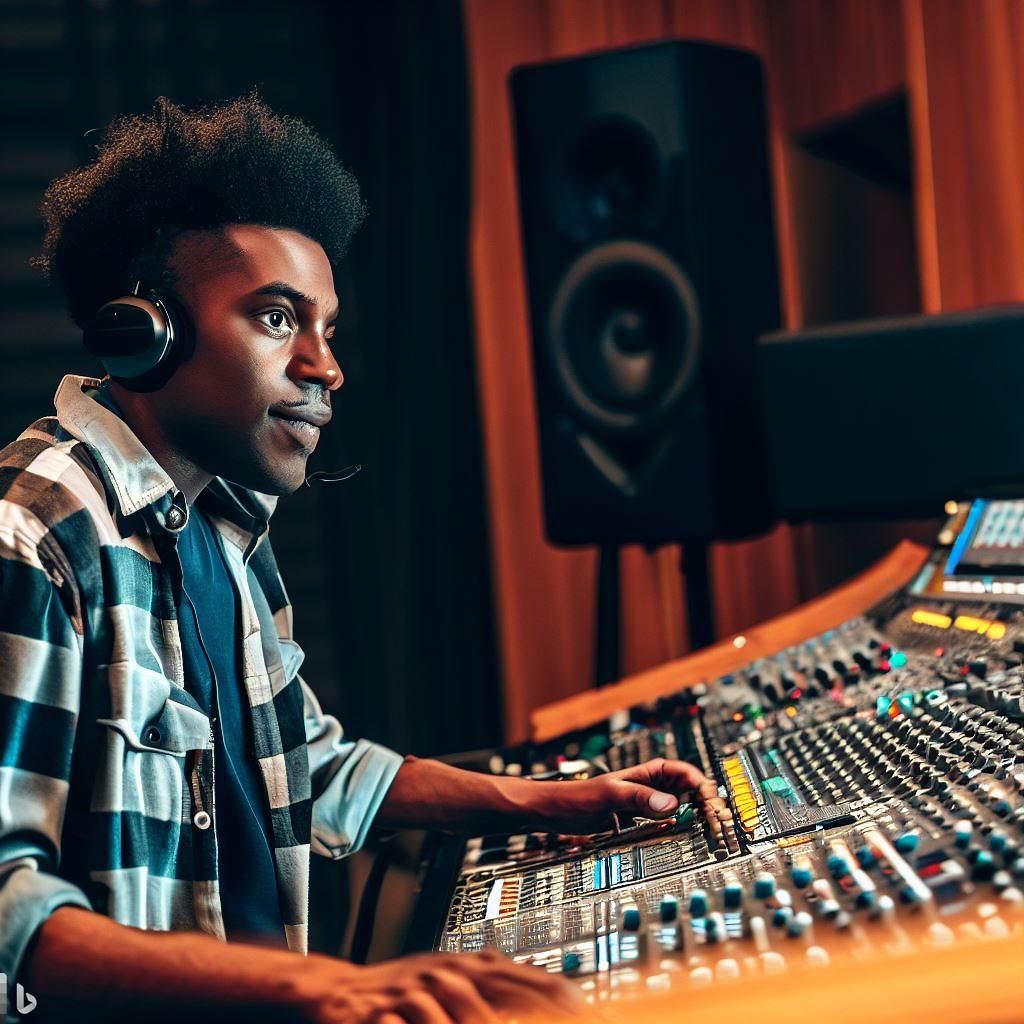Introduction
Artists’ agents play a vital role in the success of Nigerian artists. They act as intermediaries between artists and potential clients, including galleries, collectors, and institutions.
These agents are responsible for negotiating contracts, securing exhibitions, and managing the business aspects of an artist’s career.
Exploring the career of artists’ agents in Nigeria is crucial as it unlocks opportunities for artists to navigate the art world effectively and professionally.
It not only provides artists with a platform to showcase their work but also ensures they receive fair compensation and recognition for their talent.
This artist aims to shed light on the importance of artists’ agents in Nigeria and the benefits they bring to the art industry.
It will also address the challenges faced by artists’ agents in a developing art market like Nigeria and how they overcome them.
Through interviews and case studies, this article will highlight the success stories of Nigerian artists who have benefited from having agents, showcasing the positive impact it has had on their careers.
Basically, exploring artists’ agent careers in Nigeria is crucial for the growth and development of the art industry.
It provides artists with the necessary support, opportunities, and guidance they need to navigate the complex art world successfully.
Stay tuned for the next article to learn more about this fascinating aspect of the Nigerian art scene.
Understanding the Role of an Artists’ Agent
Definition and responsibilities of an artists’ agent
- An artists’ agent is a professional who represents and promotes artists in the entertainment industry.
- They act as a middleman between the artists and potential employers, such as galleries, publishers, and event organizers.
- Agents negotiate contracts, secure deals, and ensure artists receive fair compensation for their work.
- They handle various administrative tasks including scheduling, marketing, and managing artists’ careers.
- Agents also provide guidance and support to artists, helping them navigate the industry and make strategic decisions.
How artists’ agents facilitate the careers of artists
- Agents play a crucial role in networking and establishing connections within the industry.
- They actively seek opportunities for artists to exhibit their work, collaborate with other professionals, and gain exposure.
- By leveraging their industry knowledge and contacts, agents can open doors to new markets and audiences for artists.
- Agents also handle the business side of artists’ careers, allowing them to focus on their creative process
. - They negotiate fair contracts, ensure artists receive proper royalties, and protect their intellectual property rights.
Key skills and qualities required to become a successful artists’ agent
- Excellent communication and interpersonal skills to build and maintain relationships with artists and industry professionals.
- Strong negotiation abilities to secure lucrative deals and favorable terms for artists.
- Knowledge of the art market, trends, and industry regulations to guide artists effectively.
- Marketing and promotional skills to create effective strategies and campaigns for artists’ work.
- Organizational and multitasking abilities to manage artists’ schedules, contracts, and promotional events efficiently.
- Creative problem-solving skills to overcome challenges and support artists’ career development.
- Passion for the arts and a genuine interest in fostering artistic talent.
- Integrity, trustworthiness, and ethical conduct to protect artists’ interests and maintain professional credibility.
Being an artists’ agent in Nigeria presents a unique set of challenges and opportunities.
The Nigerian art scene is vibrant, diverse, and rapidly growing, creating ample possibilities for agents to connect artists with local and international audiences.
However, the lack of established infrastructure and professional standards in the industry can make the role more demanding.
Agents need to be proactive, adaptable, and willing to navigate a dynamic environment to ensure the success of their artists.
Nevertheless, the potential rewards are significant, both financially and artistically.
By championing Nigerian artists, agents contribute to the promotion of Nigerian culture, talent, and creativity on a global scale.
They play a crucial part in elevating the profile of Nigerian artists and positioning them as influential contributors to the art world.
Being an artists’ agent requires a unique blend of business acumen and passion for the arts.
Successful agents have the ability to connect artists with opportunities, guide them through challenges, and ultimately propel their careers forward.
In the Nigerian context, agents have the power to shape the trajectory of the Nigerian art scene and showcase its immense potential to the world.
Read: Rising Stars: Nigeria’s Top Emerging Costume Designers
Challenges Faced by Artists’ Agents in Nigeria
A career as an artist’s agent in Nigeria comes with its own set of challenges.
In this section, we will explore some of the major obstacles that agents face in the Nigerian art scene.
Lack of formal education and training opportunities
- Artists’ agents in Nigeria often lack access to formal education opportunities specific to their profession.
- This absence of specialized training makes it difficult for agents to develop the necessary skills and knowledge.
- Without formal education, agents may struggle to understand the intricacies of the art business and effectively represent their artists.
- This limitation can hinder their ability to negotiate contracts, promote works, and navigate the international art market.
- As a result, many agents rely on learning through personal experience and informal mentorship.
Limited infrastructure and resources
- Nigeria’s art industry faces infrastructure challenges, including inadequate gallery spaces and exhibition venues.
- The lack of proper infrastructure makes it difficult for artists’ agents to showcase and market their artists’ works.
- Additionally, limited access to resources such as art materials, technology, and financial support hinders the development of artists’ careers.
- Agents often struggle to provide their artists with the necessary tools and resources to create and exhibit their artwork.
- This lack of infrastructure and resources can impede an agent’s ability to attract potential buyers and secure exhibition opportunities.
Cultural and societal factors affecting the profession
- Nigeria’s cultural and societal factors pose challenges to the profession of artists’ agents.
- In some Nigerian communities, there is limited recognition and appreciation for the value and importance of art.
- This lack of understanding can make it difficult for agents to generate interest and demand for their artists’ works.
- Furthermore, societal expectations often prioritize more traditional and financially secure career paths.
- This pressure can discourage aspiring agents from pursuing a career in the art industry.
Financial constraints and unstable income
- Artists’ agents in Nigeria often face financial constraints and an unstable income.
- Many agents work on a commission basis, earning a percentage of the artists’ sales.
- If the artists they represent are not successful in selling their works, the agents may struggle financially.
- In addition, the art market can be unpredictable, making it challenging for agents to predict and secure steady income.
- Limited government support and a lack of structured art markets further exacerbate the issue.
Generally, artists’ agents in Nigeria encounter various challenges that hinder their ability to thrive in the profession.
The lack of formal education and training opportunities, limited infrastructure and resources, cultural and societal factors, as well as financial constraints and unstable income all contribute to these difficulties.
Despite these challenges, many agents continue to work tirelessly to support and promote Nigerian artists, contributing to the growth and recognition of the country’s vibrant art scene.
Read: Career Progression for Artists’ and Performers’ Agents
Opportunities for Artists’ Agents in Nigeria
Expanding art market and increasing demand for agents
Nigeria’s art market is experiencing growth, with an increasing number of artists seeking representation.
As a result, there is a rising demand for artists’ agents who can connect artists with potential buyers, negotiate deals, and manage their careers.
Collaborations with galleries, museums, and art institutions
Artists’ agents in Nigeria have the opportunity to collaborate with galleries, museums, and art institutions to showcase their artists’ work.
These partnerships can provide exposure, networking opportunities, and potential sales for both the agents and the artists they represent.
Potential international opportunities for Nigerian artists’ agents
Nigerian artists’ agents have the potential to expand their reach beyond the local market.
With the global interest in African art , there are opportunities for agents to promote Nigerian artists on an international scale.
This can lead to exhibitions, art fairs, and collaborations with foreign galleries and collectors.
Importance of networking and building relationships within the art community
In the art industry, networking and building relationships are crucial for success.
Artists’ agents in Nigeria must actively engage with artists, collectors, curators, and other stakeholders in the art community.
By attending art events, joining art associations, and participating in workshops, agents can establish themselves as trusted and well-connected professionals.
Networking with artists
Artists’ agents should build strong relationships with artists by attending their exhibitions, studio visits, and open houses. This enables agents to understand the artists’ work, vision, and career goals, which is essential for effective representation.
Connecting with collectors and buyers
Agents should actively network with collectors and buyers to understand their preferences, interests, and budget.
By building relationships with potential buyers, agents can curate and present artworks that align with their clients’ tastes.
Collaborating with curators and art institutions
Curators and art institutions play a vital role in promoting artists and organizing exhibitions.
Agents should collaborate with them to showcase their artists’ work in galleries, museums, and art events.
This exposure can attract potential buyers and further enhance the artists’ careers.
Participating in art workshops and events
Agents should actively participate in art workshops, seminars, and events to stay updated with the latest trends, techniques, and market insights.
These events also provide valuable networking opportunities with other industry professionals.
Utilizing social media and online platforms
Agents can leverage social media and online platforms to showcase their artists’ work, connect with a wider audience, and attract potential buyers.
Online platforms like websites, art forums, and social media groups can serve as virtual galleries for agents to promote and sell artworks.
Lastly, the Nigerian art market offers numerous opportunities for artists’ agents.
By capitalizing on the expanding art market, collaborating with galleries and art institutions, exploring international opportunities, and actively networking within the art community, agents can thrive in this dynamic industry.
Read: Balancing Free Speech and Reporting in Nigeria

Discover More: Insights into Nigeria’s Performer Management Industry
Tips for Starting a Career as an Artists’ Agent in Nigeria
Seeking mentorship and guidance from experienced agents
- Find established artists’ agents who are willing to mentor and offer guidance.
- Learn from their experience and gain insights into the industry.
- Take advantage of their knowledge and network to expand your business.
Developing a strong understanding of the local and international art scene
- Study the Nigerian art market and familiarize yourself with its dynamics.
- Stay updated on international art trends and developments.
- Learn about different artistic styles and movements.
Building a network of artists and industry professionals
- Attend art exhibitions, workshops, and networking events.
- Connect with artists, curators, gallery owners, and collectors.
- Network with other artists’ agents to collaborate and share resources.
Utilizing online platforms and social media for exposure
- Create a professional website to showcase the artists you represent.
- Use social media platforms to promote your artists’ work and events.
- Engage with the online art community and share interesting art-related content.
Staying updated on industry trends and developments
- Read art magazines, blogs, and industry publications.
- Attend art seminars, conferences, and workshops.
- Follow influential art critics, curators, and gallery owners on social media.
By following these tips, you can establish yourself as a successful artists’ agent in Nigeria.
Remember, building a career in this field requires dedication, passion, and continuous learning.
Read: How to Become a Successful Mixing Engineer in Nigeria
Success Stories: Nigerian Artists’ Agents
Successful Nigerian artists’ agents and their achievements
- Emeka Okafor: Okafor represents renowned Nigerian artist Nnenna Okore and has helped her secure international gallery exhibitions.
- Fatima Mohammed: Mohammed represents popular Nigerian painter Njideka Akunyili Crosby, who won the prestigious MacArthur Fellowship in 2017.
- Ibrahim Yakubu: Yakubu’s representation of sculptor Ndidi Dike led to her artwork being featured in major art fairs across the globe.
Each success story showcases different approaches and strategies
- Emeka Okafor’s approach involves actively networking with prominent gallery owners and curators, allowing him to secure international opportunities for his artist.
- Fatima Mohammed’s strategy includes leveraging her artist’s unique identity as a Nigerian immigrant, highlighting the diaspora experience in her work.
- Ibrahim Yakubu’s success lies in his emphasis on collaboration, frequently partnering with international artists and curators to promote Ndidi Dike’s sculptures.
Lessons learned from these agents’ experiences
- Building strong relationships within the art industry is crucial for securing opportunities for artists.
- Embracing an artist’s unique cultural background can enhance their marketability and attract attention.
- Collaboration with international artists can open doors to global exhibitions and increase an artist’s exposure.
- Staying informed about art trends, market demand, and industry events is vital for agents to make informed decisions.
- Effectively utilizing online platforms and social media can help agents broaden their artists’ reach and connect with relevant contacts.
- Patience and persistence are essential qualities for agents, as success may not come immediately, but continuous effort yields results.
- Developing excellent communication and negotiation skills is key for agents to advocate for their artists’ interests effectively.
- Agents must be knowledgeable about legal and contractual aspects to protect their artists’ rights and ensure fair agreements.
- Investing time and resources in artist development, including workshops, residencies, and commissions, can enhance an artist’s career trajectory.
- Celebrating and promoting an artist’s achievements actively can contribute to their overall success and recognition.
Most importantly, Nigerian artists’ agents like Emeka Okafor, Fatima Mohammed, and Ibrahim Yakubu have demonstrated the significant impact they can make in advancing artists’ careers.
Their achievements highlight the diverse approaches and strategies employed in the Nigerian art scene, while their experiences teach valuable lessons for budding agents.
By foster strong relationships, embracing cultural identities, collaborating with international partners, and staying informed, agents can help artists flourish in a competitive industry.
Conclusion
Recap of the main points discussed in the article
Throughout this article, we have explored the role of artists’ agents from a Nigerian perspective.
We learned about the key responsibilities of artists’ agents, including negotiating contracts, managing clients’ careers, and securing opportunities for their clients.
We also discussed the challenges that artists’ agents face in Nigeria, such as the lack of recognition and support for their profession.
Encouragement for aspiring artists’ agents in Nigeria
To aspiring artists’ agents in Nigeria, it is essential to believe in your abilities and passion for the arts.
Pursuing a career as an artists’ agent can be rewarding, despite the challenges. It requires dedication, perseverance, and a deep understanding of the art industry.
With the right skills and mindset, you can make a significant impact on the Nigerian art scene and support talented artists in reaching their full potential.
Importance of exploring this career path in Nigeria
Exploring a career as an artists’ agent in Nigeria is crucial for the continued growth and development of the Nigerian art industry.
Artists’ agents play a vital role in connecting talented artists with opportunities, both nationally and internationally.
By advocating for their clients and supporting their professional growth, artists’ agents contribute to the overall advancement of Nigerian art and culture.
In summary, aspiring artists’ agents should consider the Nigerian art scene as a promising platform to make a meaningful impact, despite the challenges.
By navigating these challenges with passion, perseverance, and a deep understanding of the art industry, artists’ agents can contribute to the success and recognition of Nigerian artists on a global scale.



